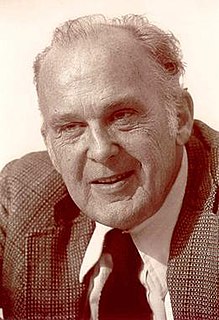
John Philippe Rushton was a Canadian psychologist and author. He taught at the University of Western Ontario and became known to the general public during the 1980s and 1990s for research on race and intelligence, race and crime, and other apparent racial variations. His book Race, Evolution, and Behavior (1995) is about the application of r/K selection theory to humans.

Biological anthropology, also known as physical anthropology, is a scientific discipline concerned with the biological and behavioral aspects of human beings, their extinct hominin ancestors, and related non-human primates, particularly from an evolutionary perspective. This subfield of anthropology systematically studies human beings from a biological perspective.

Sociobiology is a field of biology that aims to examine and explain social behavior in terms of evolution. It draws from disciplines including psychology, ethology, anthropology, evolution, zoology, archaeology, and population genetics. Within the study of human societies, sociobiology is closely allied to Darwinian anthropology, human behavioral ecology and evolutionary psychology.

Kevin B. MacDonald is an American anti-semitic conspiracy theorist, white supremacist and a retired professor of psychology at California State University, Long Beach (CSULB). MacDonald is known for his promotion of an antisemitic theory, according to which Western Jews have tended to be politically liberal and involved in politically or sexually transgressive social, philosophical, and artistic movements, because Jews have biologically evolved to undermine the societies in which they live. In short, MacDonald argues that Jews have evolved to be highly ethnocentric, and hostile to the interests of white people.

Niche construction is the process by which an organism alters its own local environment. These alterations can be a physical change to the organism’s environment or encompass when an organism actively moves from one habitat to another to experience a different environment. Examples of niche construction include the building of nests and burrows by animals, and the creation of shade, influencing of wind speed, and alternation of nutrient cycling by plants. Although these alterations are often beneficial to the constructor they are not always.

The Culture of Critique series is a trilogy of books by psychology professor and anti-semitic conspiracy theorist Kevin B. MacDonald claiming that evolutionary psychology provides the motivations behind Jewish group behavior and culture. Through the series, MacDonald asserts that Jews as a group have biologically evolved to be highly ethnocentric and hostile to the interests of white people. He asserts Jewish behavior and culture are central causes of antisemitism, and promotes conspiracy theories about alleged Jewish control and influence in government policy and political movements.
Geoffrey F. Miller is an American evolutionary psychologist, serving as an associate professor of psychology at the University of New Mexico who has researched sexual selection in human evolution.

Donald Thomas Campbell was an American social scientist. He is noted for his work in methodology. He coined the term "evolutionary epistemology" and developed a selectionist theory of human creativity. A Review of General Psychology survey, published in 2002, ranked Campbell as the 33rd most cited psychologist of the 20th century.
John Tooby is an American anthropologist, who, together with psychologist wife Leda Cosmides, helped pioneer the field of evolutionary psychology. Tooby received his PhD in Biological Anthropology from Harvard University in 1989 and is currently Professor of Anthropology at the University of California, Santa Barbara.
Cultural learning is the way a group of people or animals within a society or culture tend to learn and pass on information. Learning styles are greatly influenced by how a culture socializes with its children and young people. Cross-cultural research in the past fifty years has primarily focused on differences between Eastern and Western cultures. Some scholars believe that cultural learning differences may be responses to the physical environment in the areas in which a culture was initially founded. These environmental differences include climate, migration patterns, war, agricultural suitability, and endemic pathogens. Cultural evolution, upon which cultural learning is built, is believed to be a product of only the past 10,000 years and to hold little connection to genetics.
Donald Symons is an American anthropologist best known as one of the founders of evolutionary psychology, and for pioneering the study of human sexuality from an evolutionary perspective. He is one of the most cited researchers in contemporary sex research. His work is referenced by scientists investigating an extremely diverse range of sexual phenomena. Harvard psychologist Steven Pinker describes Symons' The Evolution of Human Sexuality (1979) as a "groundbreaking book" and "a landmark in its synthesis of evolutionary biology, anthropology, physiology, psychology, fiction, and cultural analysis, written with a combination of rigor and wit. It was a model for all subsequent books that apply evolution to human affairs, particularly mine."
Dual inheritance theory (DIT), also known as gene–culture coevolution or biocultural evolution, was developed in the 1960s through early 1980s to explain how human behavior is a product of two different and interacting evolutionary processes: genetic evolution and cultural evolution. Genes and culture continually interact in a feedback loop, changes in genes can lead to changes in culture which can then influence genetic selection, and vice versa. One of the theory's central claims is that culture evolves partly through a Darwinian selection process, which dual inheritance theorists often describe by analogy to genetic evolution.
Evolutionary developmental psychology (EDP) is a research paradigm that applies the basic principles of Darwinian evolution, particularly natural selection, to understand the development of human behavior and cognition. It involves the study of both the genetic and environmental mechanisms that underlie the development of social and cognitive competencies, as well as the epigenetic processes that adapt these competencies to local conditions.
Evolutionary educational psychology is the study of the relation between inherent folk knowledge and abilities and accompanying inferential and attributional biases as these influence academic learning in evolutionarily novel cultural contexts, such as schools and the industrial workplace. The fundamental premises and principles of this discipline are presented below.

Race, Evolution, and Behavior: A Life History Perspective is a book by Canadian psychologist and author J. Philippe Rushton. Rushton was a professor of psychology at the University of Western Ontario for many years, and the head of the controversial Pioneer Fund. The first unabridged edition of the book came out in 1995, and the third, latest unabridged edition came out in 2000; abridged versions were also distributed.
Biocultural anthropology can be defined in numerous ways. It is the scientific exploration of the relationships between human biology and culture. "Instead of looking for the underlying biological roots of human behavior, biocultural anthropology attempts to understand how culture affects our biological capacities and limitations."
Darwinian anthropology describes an approach to anthropological analysis which employs various theories from Darwinian evolutionary biology. Whilst there are a number of areas of research that can come under this broad description some specific research projects have been closely associated with the label. A prominent example is the project that developed in the mid 1970s with the goal of applying sociobiological perspectives to explain patterns of human social relationships, particularly kinship patterns across human cultures.
Evolutionary psychology has traditionally focused on individual-level behaviors, determined by species-typical psychological adaptations. Considerable work, though, has been done on how these adaptations shape and, ultimately govern, culture. Tooby and Cosmides (1989) argued that the mind consists of many domain-specific psychological adaptations, some of which may constrain what cultural material is learned or taught. As opposed to a domain-general cultural acquisition program, where an individual passively receives culturally-transmitted material from the group, Tooby and Cosmides (1989), among others, argue that: "the psyche evolved to generate adaptive rather than repetitive behavior, and hence critically analyzes the behavior of those surrounding it in highly structured and patterned ways, to be used as a rich source of information out of which to construct a 'private culture' or individually tailored adaptive system; in consequence, this system may or may not mirror the behavior of others in any given respect.".
Cultural evolution is an evolutionary theory of social change. It follows from the definition of culture as "information capable of affecting individuals' behavior that they acquire from other members of their species through teaching, imitation and other forms of social transmission". Cultural evolution is the change of this information over time.
There are two main approaches currently used to analyze archaeological remains from an evolutionary perspective: evolutionary archaeology and behavioral ecology. The former assumes that cultural change observed in the archaeological record can be best explained by the direct action of natural selection and other Darwinian processes on heritable variation in artifacts and behavior. The latter assumes that cultural and behavioral change results from phenotypic adaptations to varying social and ecological environments.







